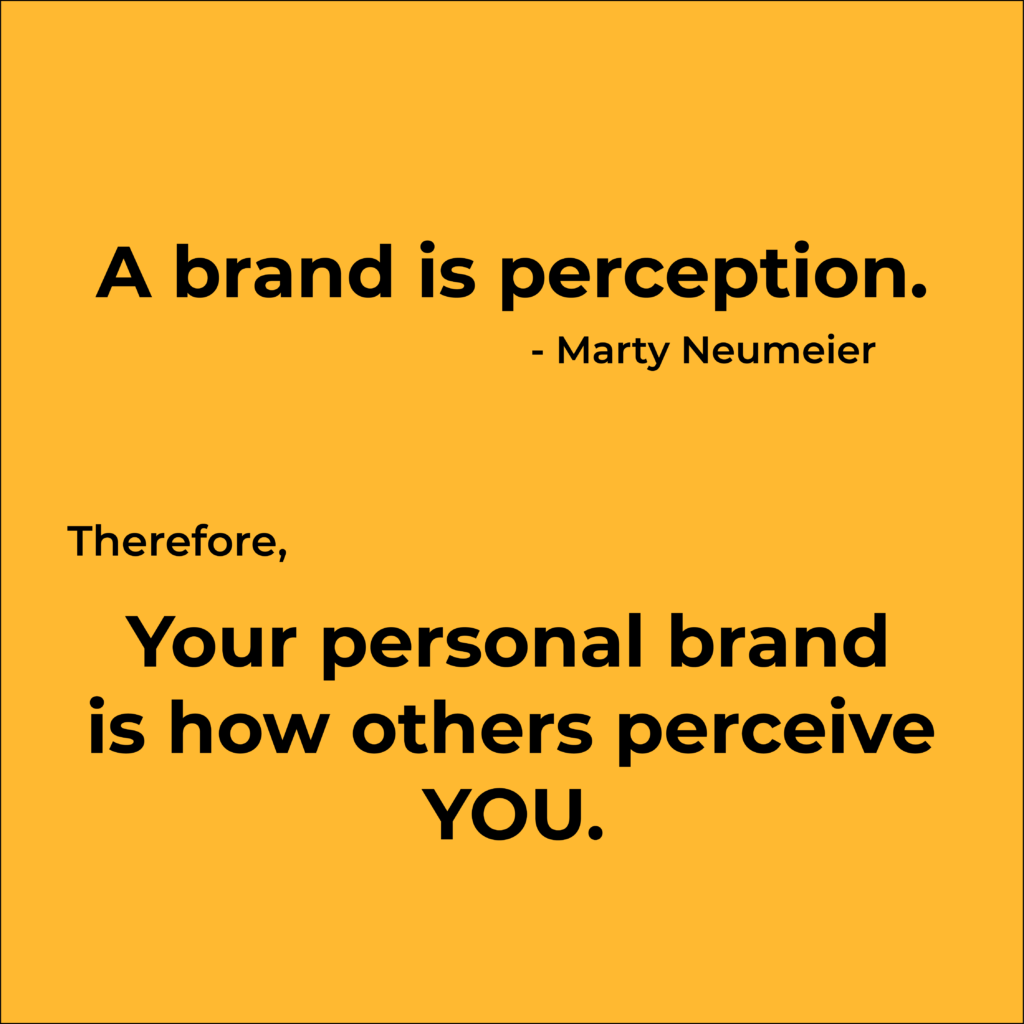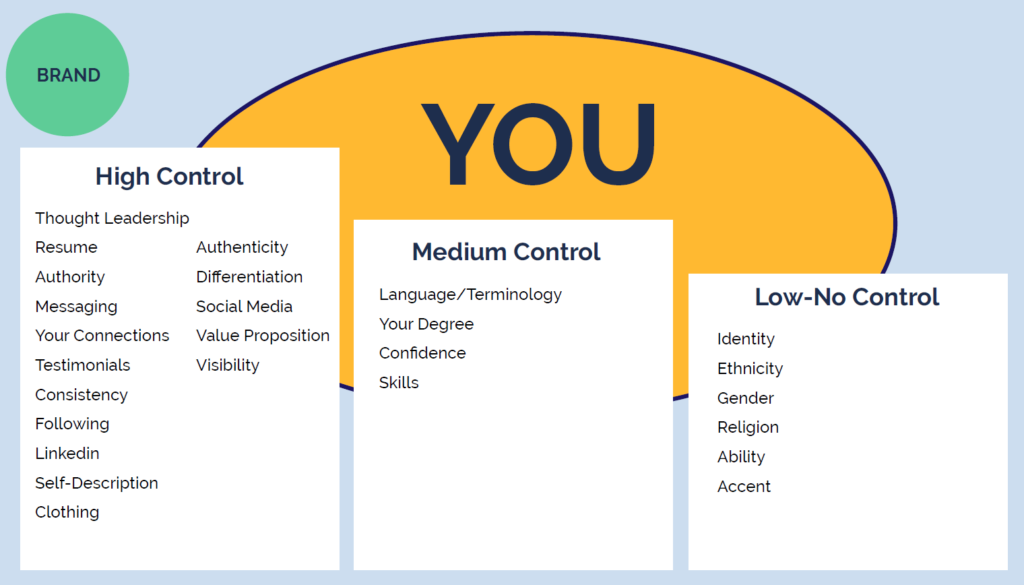#4 Career Foundations Series (Go Back to 3)
I’ve mostly hated personal branding. It generally makes me feel hardcore imposter syndrome. A voice in my head says “Who do you think you are?” or “They’re not going to buy that you’re that good.”
And it’s tempting.
- Tempting to pull back.
- Tempting to be timid.
- Tempting to hide our accomplishments or minimize them.
- Tempting to stay small.
The thing that really sucks is that a personal brand is an absolute must, but it flies in the face of how many of us like to fly– as in, under the radar.
We are taught not to talk about ourselves or brag on ourselves, after all. That’s pride. That’s ego…
I talked to another post about why you need a personal brand, so this post won’t rehash all of that. But let me just say that a great personal brand will bring you opportunities, connection, and ultimately let you have the career you want to have.
So what is a personal brand?
A brand, according to Marty Neumeier, is perception. And personal branding is no different. Your personal brand is how people perceive you.

We all make judgments about people all day every day. It’s what makes us human. We look at things like facial expression, dress, presentation, and so many more nonverbal cues to figure out if we trust someone.
Really, we humans kind of suck. But it’s an evolutionary thing at work, and it’s there whether we like it or not. That gut intuition is telling us who to trust.
Your personal brand creates trust
When people get the impression they can trust us, work with us, hire us, give us their money, it will change our lives.
Employers usually look for one thing to tell them if they can trust that an employee can be great at a job. EXPERIENCE.
But in the absence of experience (or even with it), there are two things that can RAPIDLY build your trust: your network and your personal brand.
(I’ll talk about your network next time.)
Like a network, a personal brand gives you an edge–especially if you’re a new grad. Because an employer needs to trust you. Trust that you can do a job is usually based on experience. So if you have none, your personal brand and network will fill the gap.
In the absence of experience, there are two things that can rapidly build trust: your network and your personal brand.
How does authenticity fit?
We all like to believe that we have a real, true self at our core, and our mommies and daddies teach us that, if people don’t like us for who we are, phooey on them.
Authenticity does matter, to some extent. But we can cultivate the best image of ourselves, based on WHO WE REALLY ARE (no frontin’).
“That’s gross,” you say. “I just want to be myself. If they don’t like me… F*%# them!”
But hold on. If you use a dating app, you’re going to carefully cultivate your image. Does that mean that you’re dating profile is the real you? I hope not!
And a personal brand is the same. The version of you that an employer wants to hire, that a company wants as a consultant, that a person wants to trust, is just as much the authentic you as the version of you that sat watching Netflix covered in Cheetos dust last Sunday night.
2 Questions to clarify your personal brand
There are two questions you can ask yourself to set your brand on fire…
- Who do I add value to?
- What parts of me serve them?
1. Who do I add value to?
If you’re looking for a job, you’re going to add value to an employer. You’re going to save them time, run a complicated project, make them shine on their online profiles, or balance their books. If you’re an entrepreneur, you add value to their clients: give them clarity, make them more, help them win.
2. What parts of me serve them?
This means, figure it out the role you will play and how your personal brand feeds into that.
- If you want to be an accountant doing tax returns, what parts of you do you need to show? Is it your reliability? Your competence? The fact that you have experience getting larger then normal tax returns?
- If you’re a research associate, you want people to see your research experience, reports you produced, that you write well, that you’re smart and sharp.
- If you’re a graphic designer, you want to be approachable, creative (especially visually).
If I’m hiring an accountant, I don’t want them to seem wishy washy. If I’m hiring a research assistant, I don’t want someone who can’t write worth beans.
Why? You already know… TRUST.
The people you want to serve are going to dictate the person you are.
How do you figure out who they are and how you add value?
Trial and error. Explore. Read job postings. If you’ve got your vision set, you should had a better idea of where to start.
How to build your brand
Let’s talk about LinkedIn first. It’s my favorite, and you can totally choose how you present yourself. LinkedIn is the ultimate tool for reinvention. And most people treat it like it’s a boring resume.
If you can master building your brand on LinkedIn, you can do anything you want with your career. You will get job opportunities, you can go from $0 a year to six figures. All by building a solid personal brand on LinkedIn.
I won’t go into all the details here. I have some guides that will help here:
6 Steps to Write the Perfect LinkedIn About Section (LinkedIn Summary)
10 Powerful LinkedIn Tips to Take Your Networking Game to the Next Level (Video).
But you figure out your target career, and create your LinkedIn accordingly.
- Build a profile that reflects your personal brand.
- Start connecting to people, and don’t be afraid to send a quick note introducing yourself.
- Comment on other people’s posts in your chosen domain.
- Create your own content to set yourself up as a leader.
Resume and Cover Letters
The only other exposure most potential employers will have to your personal brand is your resume and cover letter. While they’re not as great as LinkedIn, and I secretly love to hold my resume until I network with someone, everyone still needs these docs at one point or another.
Make sure your resume and cover letter reflect your personal brand.
- If you’re a creative, your resume can show that through it’s design–even if you don’t have a ton of experience.
- If you’re a researcher, editor, or project manager, your resume should portray order and competence (no spelling mistakes!)
Your cover letter is a different story, and I think the best place to showcase yourself and your personal brand. If you want to be perceived as fun and creative, don’t make a boring cover letter. If you want to be perceived as a serious research professional, you might not want to talk about your cat…
Your call
(There are some GREAT examples of cover letters here.)
Your In-Person Game
When I worked for the government, I had to write speeches and responses for a cabinet minister sometimes. The responses went like this.
- If they say X, you say: “X”
So, if they say, “Why is the government only spending $5 million on this important program?” You say, “We want to streamline and test to make sure this is effective before wasting taxpayers’ money.”
So why can’t we do this with our careers? When you meet people, have some gently-scripted lines that fit your brand.
When I graduated with a PhD, and had no experience and no idea how to transition into the marketplace, I started networking. And I came up with a “script” of why I was leaving academia. (I tell some of my story here.)
- I didn’t say, “Because it’s a terrible place, and I couldn’t get a tenure-track professor job.”
- I’d say, “Because I’m really excited about doing some ‘real world’ work and applying my research to some big social problems.”
Come up with some lines that fit your accomplishments, your goals, and your visions. You can also prep some questions to ask people when you meet them (I wrote a post with a bunch of examples).

Conclusion– Control what you can control
There’s probably more I could add, but I don’t want it to be too overwhelming.
So let me leave you with this. There are a bunch of things that will impact how people perceive you. Ignore the stuff you can’t change, and focus on what you can. Every little thing you can impact increases your chances that someone will take a chance on you! And that’s what it’s all about.



